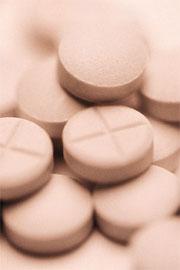 Pills popped in a nightclub are potential therapeutics too.© Punchstock
Pills popped in a nightclub are potential therapeutics too.© PunchstockThe 'club drug' ketamine may be the fastest-acting antidepressant ever tested, researchers report today.
A team based at the US National Institute of Mental Health (NIMH) in Bethesda, Maryland, studied ketamine in 17 people with major depression. All the subjects had failed to respond to treatment with standard antidepressant drugs or more drastic methods, such as electroshock therapy. But 71% felt better the day after taking ketamine, and 35% still felt better a week later. None improved when dosed with a placebo.
Most striking, the scientists say, was that some patients felt better less than 2 hours after taking ketamine. Currently approved drugs can take weeks to remedy depression. The work is published in the Archives of General Psychiatry1.
"It's almost like there's a sound barrier for those us who do depression research, and we have not been able to break it," says Carlos Zarate, chief of the mood and anxiety disorders research unit at the NIMH, and first author of the study. "That's the exciting part of this — now there is evidence that we can."
Zarate and his colleagues are not advocating that doctors start giving depressed patients ketamine right away. Large doses of the drug can cause brain damage in rodents, and its long-term health effects have not been studied in people.
"We don't want to give anyone the message to run out on the street and use ketamine," says Nuri Farber, a psychiatrist at Washington University in St Louis, who was not involved with the work. "It makes you crazy — that's why it's a banned drug."
Cure-all
Scientists are currently testing a wide range of recreationally used-and-abused drugs, including ecstasy (MDMA; see 'The ups and downs of ecstasy') and psilocybin, the active ingredient of magic mushrooms, as potential therapeutics.
Ketamine, invented in 1962 as an anaesthetic, is chemically related to phencyclidine (PCP), also known as angel dust. Both induce hallucinations and out-of-body experiences, hence their use as illegal psychedelics.
Ketamine has milder psychotic effects than PCP and is therefore also used as a legal anesthetic and horse tranquillizer. Scientists are studying whether it can be used to treat alcoholism and chronic pain, as well as depression2.
Short-cut
Ketamine targets a brain protein called the N-methyl-D-aspartate (NMDA) receptor. Existing antidepressants target brain chemicals such as serotonin, but there is growing evidence that these drugs eventually affect NMDA receptors. Ketamine may work so quickly because it takes a short-cut straight to this part of the brain.
ADVERTISEMENT
The psychotic effects of ketamine, such as euphoria, wore off before the antidepressant effects kicked in, Zarate's team found, suggesting that the drug's psychotic and antidepressant effects are separate. One surprising aspect is that other drugs that induce euphoria, such as cocaine, usually lead to a depressive crash once the high wears off.
Zarate's group is looking for substances with some of the chemical properties of ketamine, such as the ability to target NMDA, without the psychedelic effects.
Other scientists, including Farber, have developed drugs that can be taken with ketamine to damp its side effects. Giving these drugs together might help patients feel better without getting high.
Visit our drugfindsuseas_antidep.html">newsblog to read and post comments about this story.
